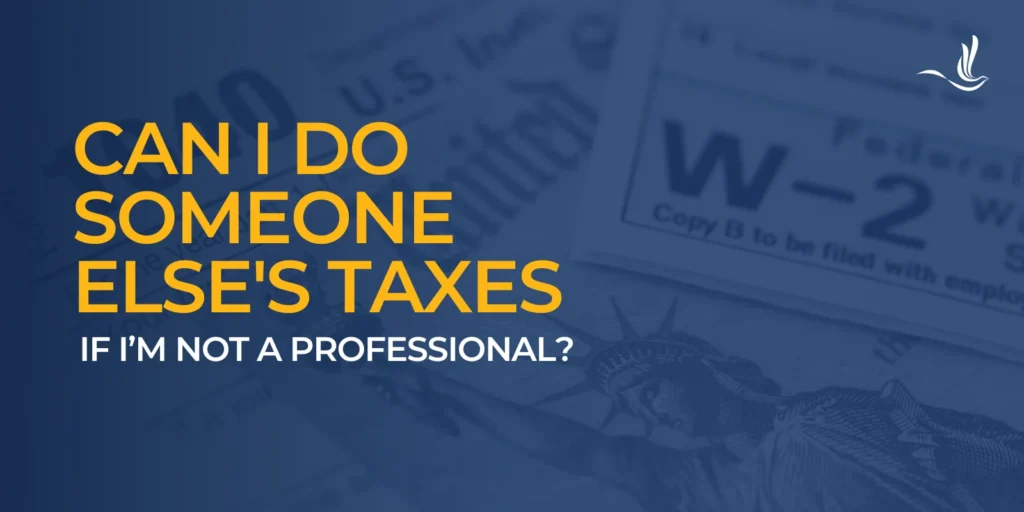Tax season often brings a mix of dread and determination as individuals and businesses prepare to file their returns. For those familiar with tax laws and confident in their abilities, the thought of helping someone else with their taxes might come up. But is it legal, advisable, or practical for a non-professional to handle another person’s taxes? Here, we explore the legalities, benefits, risks, and best practices for a non-professional filing taxes for someone else.
Legal Considerations
The first and foremost question is whether it is legal for a non-professional to prepare someone else’s taxes. The answer is generally yes, but with significant caveats. The IRS allows non-professionals to prepare and file tax returns for others without charging a fee. However, if you intend to charge for this service, you must have a Preparer Tax Identification Number (PTIN) and comply with other regulations set by the IRS. This requirement is part of the IRS’s effort to ensure that tax preparers meet minimum competency standards and adhere to ethical guidelines.
Moreover, different states may have additional regulations and licensing requirements. For example, California and Oregon have stringent requirements for tax preparers, including exams, registration, and continuing education. These regulations are designed to protect consumers by ensuring that tax preparers are knowledgeable and qualified. Therefore, it’s crucial to research and understand both federal and state-specific regulations before deciding to prepare taxes for others, especially if you plan to do so professionally.
Benefits of Non-Professional Tax Preparation
There are a number of reasons a taxpayer may use a non-professional to file their taxes.
Cost Savings
Hiring a professional tax preparer can be expensive. Fees for professional tax preparation services can range from $100 to over $1,000, depending on the complexity of the return. Friends or family members might appreciate the cost savings when a knowledgeable acquaintance offers to help for free. This can be particularly beneficial for individuals with straightforward tax situations who do not require the expertise of a certified professional.
Convenience
For simple tax situations, a non-professional might be able to complete the filing quickly and easily, especially if they have experience or a knack for financial matters. This convenience can be a significant advantage for those who are busy or find the tax filing process intimidating. By having someone they trust handle their taxes, they can save time and avoid the stress associated with tax preparation.
Learning Experience
Preparing taxes for someone else can be a valuable learning experience. It can enhance your understanding of tax laws and regulations, which might be beneficial for your own financial literacy. This hands-on experience can help you become more confident in managing your own taxes and potentially aid in professional development if you consider pursuing a career in finance or accounting.
Risks and Drawbacks
While there are some benefits to having a non-professional file your taxes, there are some obvious drawbacks and risks.
Accuracy and Expertise
Tax laws are complex and constantly changing. Without the up-to-date knowledge that professionals possess, there is a risk of errors. These mistakes can lead to fines, penalties, and additional taxes for the person whose return you prepared. For example, failing to claim a deduction correctly or misreporting income can result in significant financial consequences.
Liability
If you make a significant error on someone else’s tax return, you could be held liable for the mistake. This is especially concerning if the error results in underpayment of taxes or triggers an audit. In some cases, the IRS can impose accuracy-related penalties, which can be costly and stressful to resolve. It’s important to understand that even well-intentioned errors can have serious implications.
Ethical Concerns
Handling someone else’s financial information requires a high level of trust. Mismanagement or misuse of this information can damage relationships and lead to serious ethical and legal consequences. For instance, if you inadvertently disclose sensitive financial details, it could lead to identity theft or financial loss. Ensuring confidentiality and integrity when dealing with someone else’s taxes is crucial.
Best Practices
If you decide to prepare someone else’s taxes despite not being a professional, here are some best practices to follow.
- Get Educated: Stay informed about current tax laws and any changes that might affect the filing. Online resources, IRS publications, and tax software can be helpful.
- Use Reliable Tax Software: Tax software can guide you through the process and help minimize errors. Ensure the software is up-to-date and from a reputable provider.
- Maintain Transparency: Clearly communicate your level of expertise and any limitations you might have. Make sure the person understands that you are not a certified professional.
- Keep Records: Document all information and steps taken during the preparation process. This can be useful if there are questions or issues later. Keeping detailed records can also help if you need to amend the return or provide evidence during an audit.
- Consider Professional Review: If possible, have a professional review the return before filing. This can catch potential errors and provide peace of mind.
- Avoid Charging Fees: To stay within legal boundaries and avoid additional regulatory requirements, refrain from charging for your services unless you are fully compliant with IRS regulations. Providing free assistance helps you avoid the complexities and legalities associated with becoming a paid tax preparer.
Tax Help for Those Who Used a Non-Professional to File Their Taxes
While it is possible for a non-professional to prepare someone else’s taxes, it comes with significant responsibilities and risks. Understanding the legal requirements, maintaining accuracy, and acting ethically are crucial. By staying informed and transparent, you can help someone with their taxes while minimizing potential downsides. However, there is potential for mishaps here. If you used a non-professional to file your taxes and it resulted in penalties and interest, you are still responsible for those. If your tax situation is even slightly complicated, going with a professional is the safest bet. Optima Tax Relief is the nation’s leading tax resolution firm with over $3 billion in resolved tax liabilities.
If You Need Tax Help, Contact Us Today for a Free Consultation
Publisher: Source link











